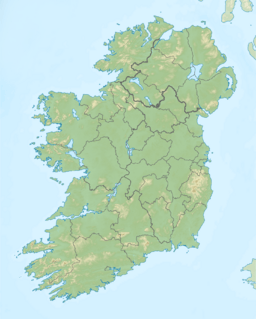Lough Fern facts for kids
Quick facts for kids Lough Fern |
|
|---|---|
| Location | County Donegal |
| Coordinates | 55°3′32″N 7°43′9″W / 55.05889°N 7.71917°W |
| Native name | Loch Fearna Error {{native name checker}}: parameter value is malformed (help) |
| Primary inflows | River Leannan |
| Primary outflows | River Leannan |
| Catchment area | 206.17 km2 (79.6 sq mi) |
| Basin countries | Ireland |
| Max. length | 2.3 km (1 mi) |
| Max. width | 0.8 km (0.5 mi) |
| Surface area | 1.81 km2 (0.70 sq mi) |
| Average depth | 2 m (6 ft 7 in) |
| Max. depth | 3 m (10 ft) |
| Surface elevation | 18.7 m (61 ft) |
| Islands | 2 |
Lough Fern is a beautiful freshwater lake located in the northwest of Ireland. You can find it in the northern part of County Donegal, close to the town of Milford. Its name in Irish is Loch Fearna.
Contents
Where is Lough Fern?
Lough Fern is found about 2 kilometres (1.2 mi) south of Milford. It's right by the R246 road. The lake is also about 10 kilometres (6 mi) north of a larger town called Letterkenny.
How Big is the Lake?
Lough Fern is quite a decent size! It measures about 2 km (1.2 mi) long and 0.8 km (0.5 mi) wide. The lake has two small islands at its northern end. One of these islands is a crannog, which is an old artificial island built a long time ago!
How Water Flows In and Out
The main river that feeds water into Lough Fern is the River Leannan. This river flows into the southern part of the lake. There's also a smaller stream that adds water at the northern end.
The water then flows out of the lake from its eastern side. It continues its journey as the River Leannan, which eventually flows into a larger body of water called Lough Swilly near the town of Rathmelton.
Wildlife of Lough Fern
Lough Fern is home to many different kinds of fish. You can find brown trout and salmon swimming in its waters. Other fish species include the three-spined stickleback and the perch.
Sadly, the European eel also lives here, but it is critically endangered, meaning there are very few left in the world. Lough Fern is a special place for nature. It is part of the Leannan River Special Area of Conservation. This means the area is protected to help keep its wildlife safe.
 | Madam C. J. Walker |
 | Janet Emerson Bashen |
 | Annie Turnbo Malone |
 | Maggie L. Walker |


